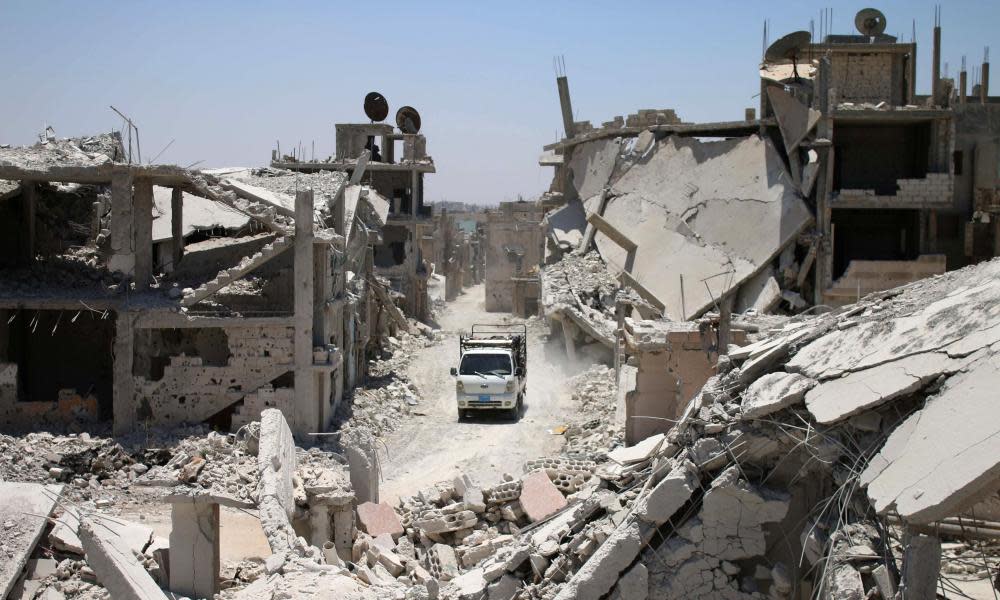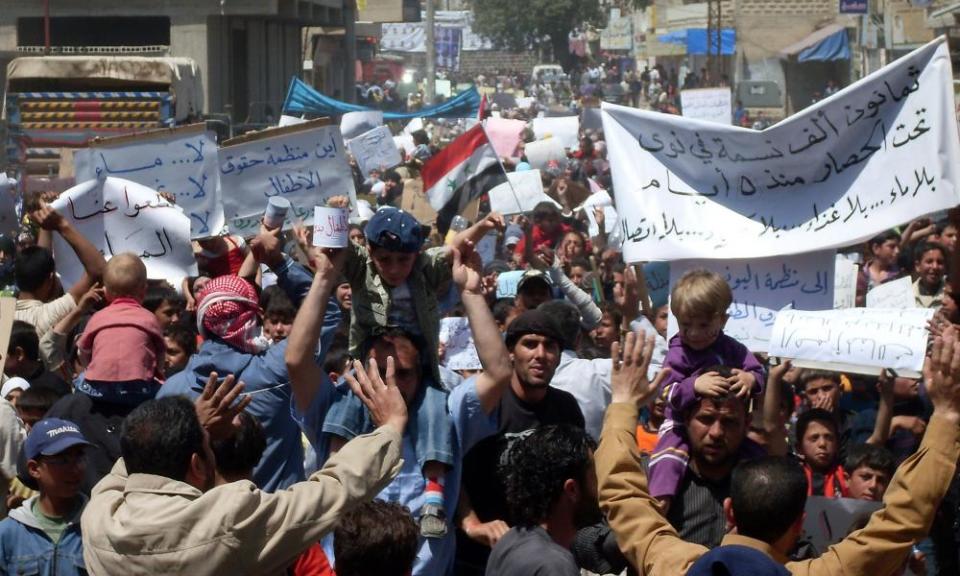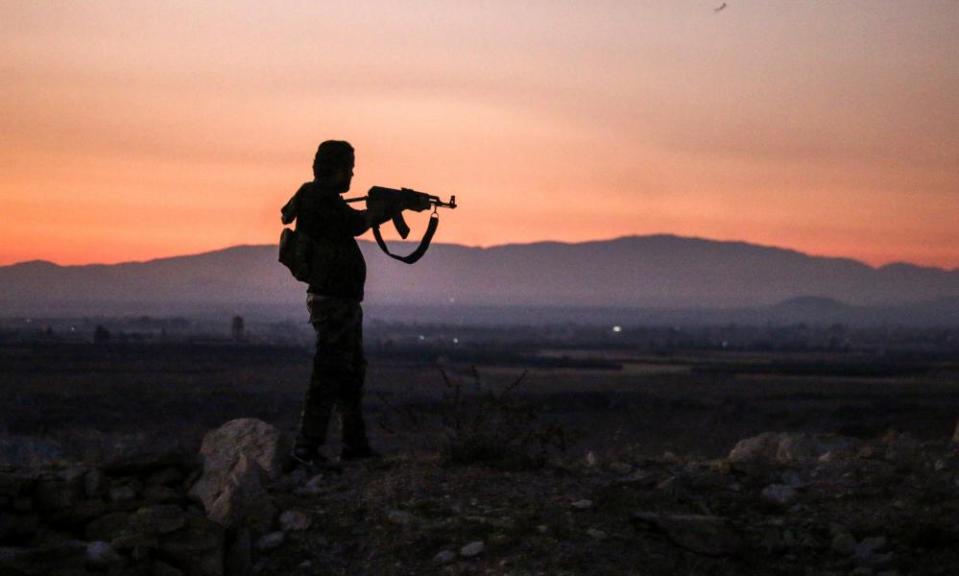A second revolution? Syrians take to streets under Russia’s watchful eye

There is no one in Syria quite like Ahmed al-Awda, a former rebel commander now on the payroll of Bashar al-Assad’s Russian allies.
To some, he is a traitor who cut a deal when Deraa province, his home, fell to the regime two years ago. To others, the 38-year-old is still a promising revolutionary - one who has just vowed to rebuild Syria’s fragmented opposition.
“Our return as one body and one army … will protect all of Syria,” the muscular figure told mourners at a funeral in a landmark speech last month, speaking with the slow and easy confidence of someone who is used to being in charge.
“We won’t stop or give up our weapons until we are victorious … the fighting has just begun.”
Such is the peculiar state of affairs in Syria’s south, which a decade ago was the birthplace of the country’s Arab spring revolution. In the current chapter of the war, Russia, the area’s power broker, is tasked with the tricky balancing act of trying to keep the local population on side, while also juggling the conflicting interests of Damascus, Tehran and Israel. The status quo is proving fragile.
Sporadic demonstrations have taken place across Deraa and the nearby Druze-majority town of Sweida over the last six weeks as civilians risked arrest to protest Syria’s worsening economic crisis.
In scenes reminiscent of 2011, demonstrators have dared to use the president’s name, chanting, clapping and dancing through the streets while calling: “Come on, leave Bashar”, “Syria is free” and “He who starves his people is a traitor”. A handful of people have been detained, but so far the unrest has not been met with a full-scale crackdown by the secret police.

“The demonstrations now are an extension of the Syrian revolution which broke out in 2011, but the economic crisis is an additional reason for people to protest,” said Abbass Munef, a 30-year-old protester from Sweida.
“The culprit is the same: the regime and its corruption. They have been stealing from the country and depriving the people of our own resources for 50 years. Since 2011, the goal has not changed. The downfall of the regime is the first step towards a decent future.”
More and more people are putting their faith in Awda to secure that better future.
Deraa was retaken from rebel forces in July 2018. Since then it has been the subject of an experiment unique in Syria, modelled on Moscow’s experiences in the second Chechen war.
Unlike other opposition areas won back by the regime, the majority of Deraa’s inhabitants were not bussed out in surrender deals and taken to Idlib province, on the Turkish border. Instead, Russia pushed Damascus towards a reconciliation deal, overseeing the recruitment of Deraa rebels into a new local security force known as the Fifth Corps, created to help the exhausted Syrian army in the battle against Islamic State. It is believed to now number around 30,000 men.
While affiliated with the Syrian Armed Forces, the Fifth Corp’s men are not part of the Syrian defence ministry: the Sunni force is openly hostile to the presence of Iranian and Hezbollah forces allied to the regime.
The Fifth Corp are paid salaries by Moscow and are supposed to follow Russian orders. After Isis was driven from Syria’s south, however, most of the men refused to then go fight in Idlib - most notably among them Awda’s unit, known as the Eighth Brigade.
Alongside duties such as manning checkpoints and guarding against Isis sleeper cell attacks, the Fifth Corps is exchanging small-scale attacks with regime-loyal forces, shielding men wanted by Damascus for evading military service, and safeguarding the recent protests.
“The people of Deraa believe that they are protected by the Fifth Assault Corps from the regime and its Iranian arms in the area. Lots of people would be arrested if the division wasn’t here. We would not protest against the regime in even small numbers if they weren’t there,” said Ahmad Muhammad, a local activist.
“The soldiers of the fifth division are still revolutionaries. They reconciled, yes, but they are really still against the regime.”

Unsurprisingly, this situation is not to Damascus’s liking - but for now, there is little it can do about it. Mindful of the potential for military escalation if Iranian and Hezbollah forces were to fully embed so close to Israel, Russia has protected the south’s autonomy and largely frustrated the regime’s attempts to crush the fledgling insurgency.
“Russia has recognised it needs to have allies among the ethnic majority Sunni Arabs in the area. It is trying to earn the goodwill of the population by helping locals find out what happened to loved ones disappeared into regime prisons,” said Elizabeth Tsurkov, a fellow at the Foreign Policy Research Institute with extensive knowledge of southern Syria’s dynamics.
“It is hard to assess what Russia’s end goal is when it comes to the Fifth Corps, though. It is very interesting that these men have been embraced locally as a patriotic anti-Iranian force rather than as turncoats. There is clearly a need for people to rationalise the choice they made to stay in Deraa.”
Awda was known for his realpolitik attitude even before the creation of the Fifth Corps. As leader of Free Syrian Army group Shabab al-Sunna, in 2015 he aligned with al-Qaida’s Syrian affiliate to expel regime forces from his hometown before turning on the jihadists and driving them out too.
For a man who lost three brothers fighting against the regime, a lasting alliance with Assad’s Russian allies was always unlikely.
Last month’s speech at a funeral for Fifth Corps men killed by an IED (improvised explosive device), which was likely to have been planted by regime loyalists, was his first clear signal he is not totally loyal to Moscow, and it proved to be a watershed moment.
Awda’s bold words against Damascus and “foreign invaders and militias” quickly turned the funeral into the biggest protest yet, which participants estimated numbered 5,000 people. According to the analyst Abdullah al-Jabassini, an expert on Deraa at the Middle East Institute, at least 7,000 men signed up with the Eighth Brigade in June alone.
Increasingly popular and powerful, Awda’s rise is a threat not just to the regime, Iran and Hezbollah, but also to his Russian paymasters.
“We are more organised now,” said Ahmad Saleh, a 26-year-old who joined the Fifth Corps in 2018. “Even though we are surrounded by regime soldiers all the time, we don’t fear them anymore.”


